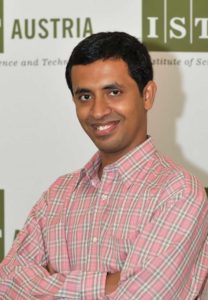December 10, 2019
ERC ‘Consolidator Grant’ awarded to IST Austria Professor Krishnendu Chatterjee
The European Research Council (ERC) has awarded IST Austria Professor, Krishnendu Chatterjee, a ‘Consolidator Grant’ for the improvement of algorithmic tools for probabilistic or stochastic models. Stochastic models are foundational to many scientific disciplines and increasingly to emerging technologies such as artificial intelligence and game theory simulations.

© IST Austria
Broadly speaking, computer models, which simulate and predict real-world systems, can be split up into two categories: Deterministic and stochastic models. Deterministic models are mathematical models that give a specific output whilst stochastic models estimate the probability of potential outcomes by allowing for the random variation of one or more inputs (otherwise known as a probability distribution). Some common everyday examples of where stochastic models are used include stock markets, currency exchanges, estimating wealth and inequality and for medical data such as blood pressure or temperature.
Whilst stochastic models have been around for a long time, the algorithms used to analyze them suffer from many fundamental problems. Furthermore, the emergence of new technologies and complex data systems have resulted in the need for algorithmic solutions that are faster, scalable and more efficient. Professor Krish Chatterjee’s project — in collaboration with scientists from the University of Vienna and Harvard University — aims to develop algorithmic solutions that will help better analyze the output from stochastic models. This new approach towards reconceptualizing the algorithmic aspects for the ‘formal methods’ used for stochastic models will inevitably benefit other scientific disciplines as well as emerging technologies such as social cooperation modelling and artificial intelligence.
Chatterjee on the potential benefits of the project: “As models become more and more complex, we need better algorithmic approaches to analyze them and tell us the answers. On the one hand, we need faster algorithmic solutions for classical models, on the other hand, we consider algorithmic solutions for new problems (e.g. evolutionary games) that have not been addressed before. We are now at a point in history in which we can attempt to solve this fundamental problem.” He adds: “It will be interesting to see the future implications of this research not only across established disciplines but also for emerging technologies and new scientific fields.”



